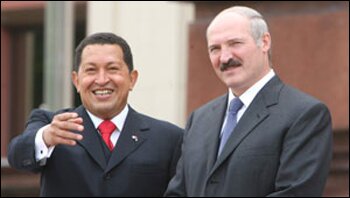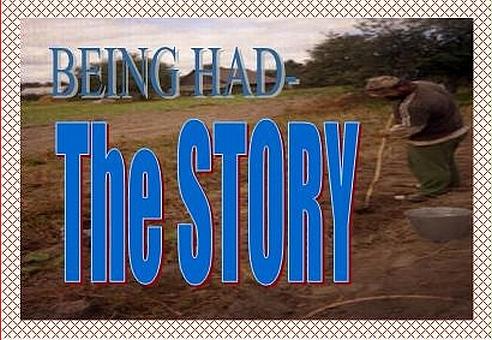The Remark...
 |
This having been said, the first question that needs to be asked is: How inherently anti-Semitic was Lukashenka's remark about Bobrusk and Jews?
The first answer is that it was incredibly anti-Semitic. It singled out Jews, described them as dirty, irresponsible people and implied that Belarus has been better off or at least more capable without them. From the Jewish perspective these are not only repetitions of ancient themes and negative stereotypes which have followed them from times of the blood libel, but to hear it from a modern, 21st century international figure is both shocking and remarkably inappropriate. And more so, hearing this at a time when Russia has been supplying uranium to Iran, the remark comes close to sounding like a declaration of war. Most probably Israel's recalling of its ambassador would have been therefore a reasonable and appropriate answer.
But before we become hysterical, we should ask some more questions. Firstly, did Lukashenka know what he was doing by singling out the Jews, or was it simply an irresponsible slip of the tongue?
First let's assume that the remark was intentional but that it was not intended as an insult to Jews. Taking the statement literally, we see that it is actually a call for wealthy Jews to come back and enter into an economic competition for Belarusian ownership. Currently Belarus has strong economic ties to two inherently anti-Semitic "friends": Hugo Chavez in Venezuela and Mohamed Ahmadinejad in Iran. Chavez according to a speech last year wholly buys into the "Jewish circles of power" conspiracy theory and of course Ahmadinejad based his elections platform on the promise of wiping Israel off the map.
(As an aside, one local rabbi once told me that he likes reading about Jewish conspiracy theories on the net:
"I go on the internet because I am bored and tired and I hate that I have no money and can't do very much. When I go to these anti-Semitic sites I can read how I am really rich and powerful and have control over the whole world. This makes me feel much better.")
Looking at it this way, the president's remarks could have meant that if the Jewish community is not careful, the country could go completely against Israel politically. In this situation, the president would only be inviting increased investment on the Jewish side for the purposes of equalizing the playing field and stopping these two "evil" countries from completely taking over their native homeland. If this is so, we are not speaking of anti-Semitism, but rather the creation of a situation where Lukashenka is simply playing one side against the other; Belarus coming out the benefactor in either case. This I guess would also be a standard sales methodology for the arms trade; in the gun business, friction always equals profits.
A second avenue is to consider is whether the president was simply using plain talk?
Though the actual percentage of genuine ethnic Belarusians is only about 25% (the death toll in the war, Stalin's re-seeding' the territory after and outward immigration primarily responsible), there is still such a thing as a Belarusian mind set. People here do have a habit of referring to others by a physical trait such as the color of their hair, or of course by their ethnicity. In the much more multi-ethnic west, this is called profiling but here it is thought of as "plain talking". When using this way of identifying each other though, there is also an additional sub question which asks if the group in question is real or strong. This particular cultural facet is shown brilliantly in the late Serei Bodrov's mafia masterpiece "Brat II". In a conversation with a Russian prostitute in Chicago, Bodrov asks why it is so wrong in America to use the word "Nigger"
- "You can't call him a nigger."
"And who is he then?"
"He's an American."
"And what's the difference?"
"Nigger, for people outside of their own kind is a bad word to use"
"But we learned this in school a long time ago: From China comes Chinese. From Germany, Germans. From Israel, Jews. So here is a nigger."
"To me it seems as though their strength lies in their circle. They live like animals, but they have something we long ago lost and therefore they are strong. And they can feel that this (word) makes you afraid."
But what if it was wasn't anti-Semitism, plain talk or business?
In the opinion of one high ranking member of the local Jewish community, who insisted on only be referred to as a businessman, despite referencing Jews specifically, the president in this case was simply crowing about how beautiful the new Bobrusk was. And in fact, he thought the president was absolutely right in general with all of his comments: Belarus these days is much cleaner than Israel and Bobrusk, before getting a facelift courtesy of the state, had been a slum. The main point to him was absolutely that the president had the right to crow over the rebuilding accomplishment and that by inviting Jews who had previously run away to return to Belarus, the president was demonstrating his openness towards the Jewish nation and religion. Bobrusk by the way still has one of the larger Jewish populations in the state; there are two synagogues and at least several hundred Jews still in residence.
He also pointed out that the country has elected several Jewish mayors which means that, right along with the natural tendency toward profiling, there would also seem to be a belief that hiring a Jew to do the job might not be such a bad idea. This is actually the case in Pinsk as Konevski, the number 2 man in the government happens to be Jewish. Konevski is proud of his heritage and once made a rather famous speech saying that though the Jewish community has only 1.5% of the population, in terms of accomplishment, it seems much, much bigger. When we first actually met in fact, his remark to me, in typical Jewish fashion, was that he was surprised that Pinsk had not heard more from me. I guess he doesn't read the English language internet.
As for myself on this subject, well, I don't really like speaking in such general terms but frankly, the students at the new Pinsk Yeshiva have been notorious for leaving the synagogue littered with clothes, empty bottles, packages, overfull ashtrays and cigarette buts. Though supposedly a holy place, they obviously had a general disinterest except for Shabbos and holidays in the condition and cleanliness of the room. This was especially true of a room above the synagogue which in theory had been set aside for special guests. Once the students found out there was a computer with an internet connection there, that area became a veritable pigsty.
Of course acting like pigs is not restricted locally only to the Jews; Pinsk as a whole seems to completely misunderstand that garbage needs to find its way to a proper receptacle. Almost anywhere you look you see discarded wrappers or broken glass, even where children would play or along the beaches. Even keeping people from urinating or throwing their garbage into our garden requires constant vigilance.
So what is the answer?
It is just as possible that the remark was much more crowing about the state's rebuilding efforts than it was about hatred or even exploitation of Jews. Bobrusk, like all of Belarus has been undergoing a facelift over the last few years and the president's presence there was in fact to commemorate this accomplishment. It is also possible that the president simply dropped into the vernacular and said something that would be taken by locals as a completely normal or even a clever business idea. However, despite "understanding" potentially where the remark was coming from I really wish he had not said what he did. The remark was crass. Of this there is no doubt. Almost all the civic centers in Belarus from the time of the Pale of Settlement until the holocaust were Jewish centers but now are not specifically because of the times before, during and after the Pale of Settlement and the holocaust. Unfortunately, no matter how much you want to believe that there is no difference between calling a Ukrainian a Banderovtsi a or a Polak a Pisheky, I think there really is a difference when speaking of Jews and the former Soviet Union. I would also seriously prefer not to believe that we are revisiting Berlin in 1932.
I am also not sure, if it was just "business", that I personally would be willing to respond to such a challenge with my wallet. To me it sounds like a con. Maybe a Russian or a Polak could be bated into such a deal, but I personally wouldn't. To me, though I understand that Belarus is now open to "all kinds" of potential investors, I would much rather bet on a transparent and honest business plan, one that had a potential for mutual gain and had some real assurances against theft, abuse and corruption. Personally I would much rather invest in a trustworthy situation than in a circus. And quite frankly, remarks like this make me very, very, very nervous.
So I guess we'll just have to wait and see what happens next. Israel is very, very angry but it is not clear whether or not Belarus wishes to do something about that. For the sake of my own, rational fears about any sorts of steps taken towards World War III, I certainly hope they do. But regardless of actual intention or whether or not we get an apology, like it or not, the man who said what he did is the president of the beautiful and interesting Republic of Belarus and he gets to run things as he likes. This, for sure we all know is the case.






















